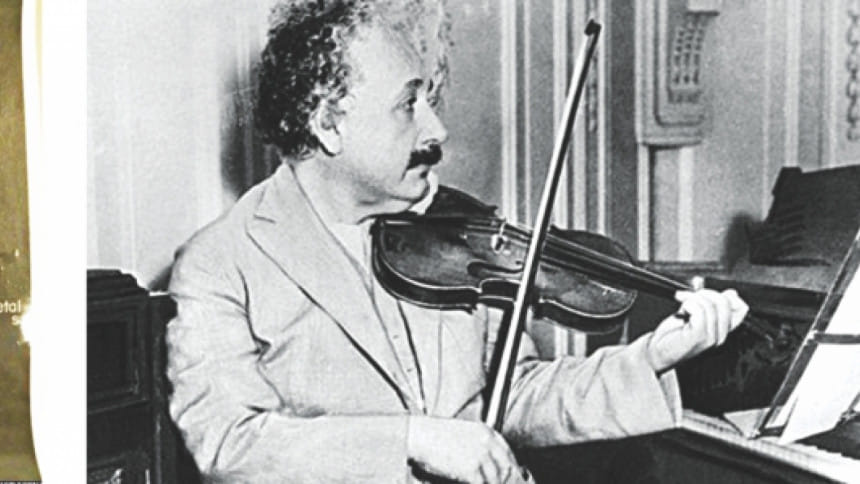Albert Einstein: the man who predicted gravitational waves

There was this pretty clever guy 100 years ago who said this is happening all the time. But we didn't know for sure until we finally managed to build a machine – like a giant ear – so we could to listen to it.
He made huge strides in physics, to the point that his surname is used as another way of calling someone a genius. Yet there is plenty more to know about the man himself.
He played the violin
He started learning when he was a young boy and continued playing until old age stopped his left hand from being able to move as quickly and precisely as was needed.
He performed at benefit concerts and used music as a relaxation tool all his life. He was a particular fan of Mozart and Bach.
His teacher said he would never amount to anything
Einstein and his family told the press that he was comparatively slow to learn to walk and talk. His sister Maja, writing about her famous brother, said that when Albert was a little boy at home in Germany, people around him worried that he would never speak.
At school, he did not enjoy studying humanities subjects. He struggled with writing and it is widely supposed that he had dyslexia, in a time before it was routinely tested for. According to his sister, his Greek teacher once told him off for the quality of work he had submitted by saying nothing would ever become of him.
He failed his university entrance exam but it was in a job as a clerk that he found time to develop his ideas. He published scientific papers, moved into an academic career, made ground-breaking strides in physics including developing the theory of general relativity, and was given the Nobel Prize in 1921.
Einstein's brain
His brain was found to have more tightly-packed neurons than usual, which might have allowed him to process information more quickly than other people. The part of his brain responsible for spatial cognition and mathematical thought was wider than normal. But some people say this is all speculation - and it would be hard to prove any link between his physical brain and his genius. Brain size varies from person to person.
A pathologist called Thomas Harvey kept the brain for four decades. In one BBC documentary in 1994, he was seen cutting a piece of the brain to give it to a visitor. Most of the remains of the brain are now in New Jersey.
He was a refugee
By the time the Nazis came to power, Einstein was already famous. His Jewish ethnicity was widely known and it became more and more difficult for him to work in the face of anti-Semitism in Europe.
In the early 1930s, Einstein took a job in the USA. Shortly afterwards, the Third Reich accused him of treason, and his books were thrown on the fire at a ceremonial book-burning by Nazi students.
Einstein helped Jews escape from Germany but had mixed feelings about having left.
He wrote in a letter: "I am almost ashamed to be living in such peace while all the rest struggle and suffer."
Turned down IsraelI presidency
In 1952, the Israeli ambassador to the US wrote to Einstein on the prime minister's behalf, asking whether he would take the role of president as a mark of "the deepest respect which the Jewish people can repose in any of its sons".
The letter assured him that he would be given "complete facility and freedom to pursue [his] great scientific work".
Turned the offer down, he replied that he was "deeply moved" but was not suited to it due to old age and his personality.
What he did and did not say
There is a truism that if you can't explain something simply, you haven't understood it well enough. The line is often attributed to Einstein, but there is no historical evidence that he said it, and versions of the same idea had been written down centuries before.
In the 1950s, a few years before his death, Einstein complained that people were quoting him too much.
He said: "In the past it never occurred to me that every casual remark of mine would be snatched up and recorded. Otherwise I would have crept further into my shell."

 For all latest news, follow The Daily Star's Google News channel.
For all latest news, follow The Daily Star's Google News channel. 



Comments